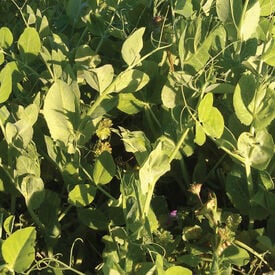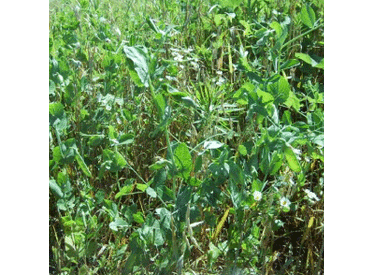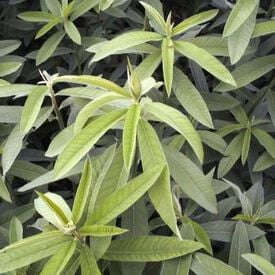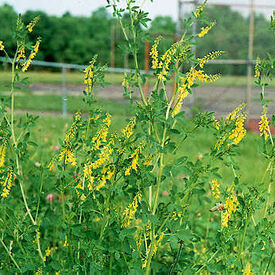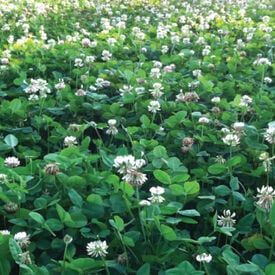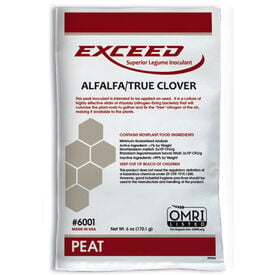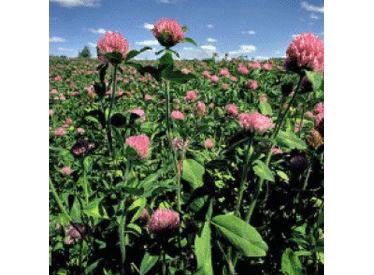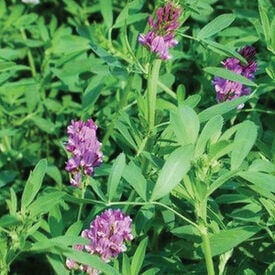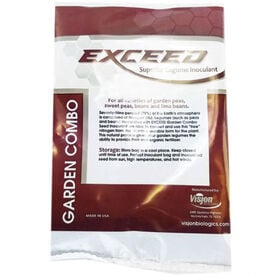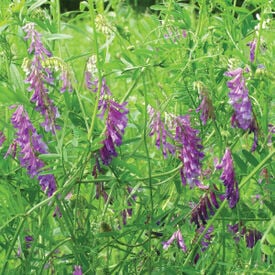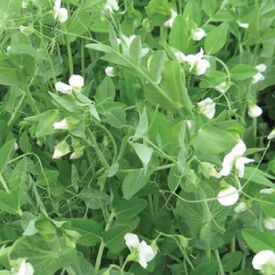The Knuckle Purple Hull is a bush type cowpea producing heavy yields of purple pods. Cowpeas in general are great for drying and canning. This variety tends to stay off the ground and cluster making for easy picking. This cowpea is referred to as a "Knuckle Hull" because of the big, plump cowpeas. Try with cowpea inoculant for maximum Nitrogen fixation.
The Elite cowpea is a bush type cream southern pea that produces heavy yields of 7" pods with cowpeas that are delicious and easy to shell. This cowpea is one of the most productive of all the cream peas. If you are using for Nitrogen fixation we highly recommend using a cowpea inoculant. Try with cowpea inoculant for maximum Nitrogen fixation.
The Secada Forage Pea is a relatively new forage pea that has a wide range of uses such as forage, green manure, weed suppression and more! This forage pea is highly palatable, self-climbing and with high dry matter yields. A fast growing, cool-season annual legume, the Secada Forage Pea performs very well during the fall, winter and spring in Southern states. In more northern climes, an early spring plant will give high dry matter yields of excellent forage. Uses: Chicken Forage, Deer Attractant, Forage, Green Manure, Nitrogen Fixation, No Till, Organic Matter (Biomass), Weed Suppression
The Texas Cream is a heavy yielding Southern cowpea that is great for fresh shelling. This variety is very similarly to 'Sadandy' but the cowpeas are slightly larger. These bush-type plants are prolific and thrive in hotter, Southern weather. Texas Cream is a "cream pea" type variety, they are generally used at the fresh shelling stage. Treated Seed.
The California Blackeye #46 is similar to California Blackeye #5, but with smaller seeds. Bred by the UCLA and released in 1987. California Blackeye #46 plants are more erect than California Blackeye #5. The seeds are a typical blackeye type of Southern peas with cream-colored seed coats and black pigments around the eyes. Heavy yielder. If using for Nitrogen fixation we highly recommend using a cowpea inoculant. Try with cowpea inoculant for maximum Nitrogen fixation.
The Packer Forage Pea, or Canadian field pea, is a cool-season legume that is used for cover crops, wildlife and winter grazing! This annual legume has good nitrogen-fixing capabilities. The Packer Forage Pea is a low-growing, viny legume which has been shown to fix over 200 pounds of nitrogen per acre per year. Uses: Chicken Forage, Deer Attractant, Forage, Green Manure, Nitrogen Fixation, No Till, Organic Matter (Biomass), Weed Suppression
The Sunn Hemp is a legume that makes an excellent cover crop as it is great for nitrogen fixation and nematode resistance in the soil. This legume is a fast-growing legume that produces significant quantities of biomass and fixes nitrogen into the soil with a short rotation of 60 days under optimum conditions. Plant the Sunn Hemp at least 8 weeks before first frost. For maximum benefit terminate crop at first flowering, prior to developing fibrous, hard-to-manage stalks. This legume is tolerant of dry conditions. Avg. 15,000 seeds/lb. Uses: Compaction Control, Erosion Control, Green Manure, Nitrogen Fixation, Organic Matter (Biomass), Weed Suppression
The Sweet Clover is a legume that is exceptional for not only attracting honey bees to the garden, but also creating green manure! This clover can grow nearly anywhere under most conditions. The Sweet Clover is our favorite clover because it is more versatile than other clovers at nitrogen fixating, erosion control and attracting beneficial insects. This variety is slow to establish the first year but comes on fast the following year and can produce up to 170 lb. of nitrogen per acre. The Sweet Clover comes OMRI Pre-inoculated. Uses: Bees & Beneficial Insects, Chicken Forage, Compaction Control, Deer Attractant, Erosion Control, Forage, Green Manure, Nitrogen Fixation, No Till, Weed Suppression
The Ladino Clover is the most popular white clover in the USA as it is two to four times as large as the common white clover! This clover has a high nutritive value and is palatability, making it a popular choice in pasture mixtures. It is not deep rooted, and will not tolerate much drought. Ryegrass and orchardgrass work well with ladino clover in mixtures. Broadcast at 25 lbs. per acre. Seed comes inoculated. Uses: Bees & Beneficial Insects, Chicken Forage, Compaction Control, Deer Attractant, Erosion Control, Forage, Green Manure, Nitrogen Fixation, No Till, Weed Suppression
Inoculants help free nitrogen from the air and into a usable form for plants. Seed Inoculants are able to convert and use this "free" nitrogen from the air into a usable form for the plant. This natural process gives your garden legumes the ability to provide their own organic fertilizer. Resulting in a more bountiful yield. Naturally. Natural, dry, peat-based cultures of beneficial bacteria. 6 ounces treats up to 50 lbs. of alfalfa and clover seed. OMRI/Organic.
Iron and Clay cowpeas makes a great cover crop for smothering weeds and adding Nitrogen to soil. This variety of cowpeas are grown just like soybeans. Iron and Clay is a fast growing plant that can reach 3'. The best time to plant is during spring for best results as the frost will kill the cowpeas. Iron and Clay has long taproots that help withstand drought conditions and can produce as much as 300 lb./acre nitrogen. This variety has a high organic matter production. Broadcast up to 120 lb./acre, 1/2 to 1" deep. Try with cowpea inoculant for maximum Nitrogen fixation.
The Mammoth Red Clover is a large, fast growing clover that is an ideal grazing crop and can be sowed in spring, summer or fall! Mammoth Red is a popular biennial clover used for Nitrogen addition and hay crops. This red clover may be the best choice for frost seeding; it is extremely cold hardy and does well in most soils and growing conditions. The Mammoth Red Clover will fix up to 70-110 lbs. nitrogen per acre. This variety's long tap roots loosen soils and mine phosphorus and other nutrients from deep in the soil. Uses: Bees & Beneficial Insects, Chicken Forage, Compaction Control, Deer Attractant, Erosion Control, Forage, Green Manure, Nitrogen Fixation, No Till, Weed Suppression
The Common Alfalfa is a somewhat winter hardy perennial legume, but it grows more quickly than other regular alfalfa varieties. As an annual green manure, this cool-season "Summer" alfalfa can produce up to 10 tons of organic matter per acre. Its long taproots break up compacted soil and bring up subsurface minerals. High nitrogen fixation and great bee forage. Alfalfa is basically good at everything, as it great for nitrogen fixation and bee forage! Just look at all it's uses below! Alfalfa (Medicago sativa L.): Cool season, broadleaf, Perennial, Legume (N-fixation), Upright plant growth, Crude protein: hay or silage 14-22% Uses: Bees & Beneficial Insects, Chicken Forage, Compaction Control, Deer Attractant, Erosion Control, Forage, Green Manure, Nitrogen Fixation, Nitrogen Scavenger, No Till, Organic Matter (Biomass), Weed Suppression
Inoculants help free nitrogen from the air and into a usable form for plants. Seed Inoculants are able to convert and use this "free" nitrogen from the air into a usable form for the plant. This natural process gives your garden legumes the ability to provide their own organic fertilizer. Resulting in a more bountiful yield. Naturally. Natural, dry, peat-based cultures of beneficial bacteria. Treats up to 8 lbs. of beans, peas, vetch and more. OMRI/Organic.
Dixie Lee cowpea seeds are a popular variety of cowpeas known for their high yield, disease resistance, and adaptability to various climates. These seeds produce vigorous, heat-tolerant plants that thrive in warm, dry conditions, making them ideal for Southern and drought-prone regions. The Dixie Lee variety is particularly favored for its tender, flavorful beans that are often used in a range of culinary dishes, from soups to side dishes. The plants typically produce medium-sized, cream-colored pods with dark brown or black-eyed beans, and they can be harvested both as fresh beans or dry beans. As a legume, Dixie Lee cowpeas also enrich the soil by fixing nitrogen, benefiting crop rotation systems.
California Blackeye #5 is a high yielding, vigorous and easy to grow. You can use these as green shell peas or dry like winter beans. Pods reach 6-8" long and are loaded with creamy, delicious seeds. Does well in high heat areas. Treated Seed.
When sown late summer, the Hairy Vetch spring regrowth is vigorous and nitrogen-producing, for tilling in before planting spring garden crops. You can sow with or without grain, grass or field peas! The typical nitrogen produced of this legume is 100 lbs. per acre. The Hairy Vetch has rapid growth that makes it a good weed suppressant. Uses: Bees & Beneficial Insects, Chicken Forage, Deer Attractant, Erosion Control, Forage, Green Manure, Nitrogen Fixation, No Till, Weed Suppression
The Austrian Winter Pea, sometimes called black pea or field pea, is a great cool season legume for cover crops, wildlife and winter grazing! This cool-season, annual legume has good, nitrogen-fixing capabilities. The Austrian Winter Pea is a low-growing, viny legume which has been shown to fix over 200 pounds of nitrogen per acre per year. It has hollow, slender and succulent stems, 2 to 4 feet long. The foliage is pale green, and the flowers are colored, usually purple, pink or reddish. Uses: Chicken forage, deer attractant, forage, green manure, nitrogen fixation, no till, organic matter (biomass), weed suppression


